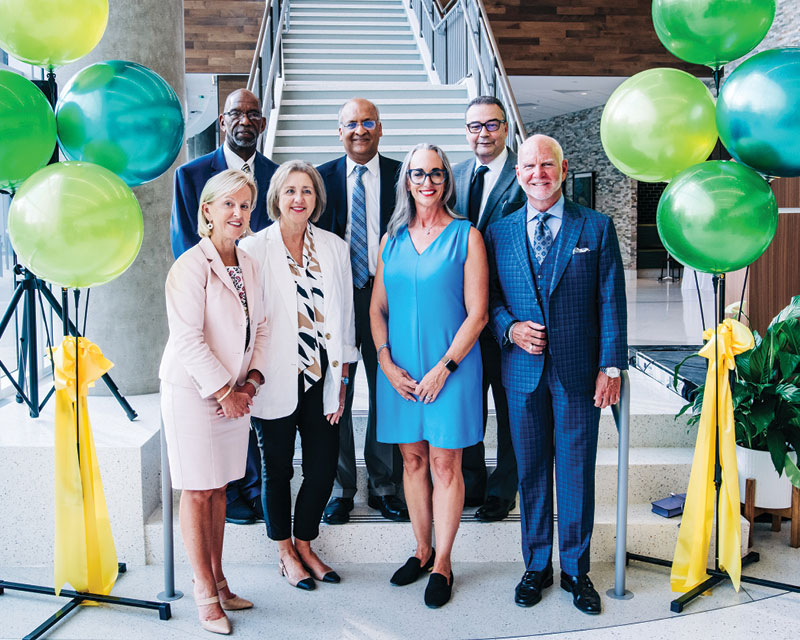The summer of 2024 marked a transformational turning point for health care in Alabama with two important developments. These advances promise to not only improve access to care for people in the Birmingham area and across the state, but also to advance the UAB Health System’s mission to provide life-changing care to all it serves.
As announced June 25, the University of Alabama System Board of Trustees approved an agreement with Ascension for UAB Health System Authority to assume ownership of Ascension St. Vincent’s Health System in central Alabama to sustain patients’ access to the highest quality care in Birmingham and surrounding communities.
Under the agreement, UAB Health System Authority will assume ownership of all Ascension St. Vincent’s sites of care including five hospitals at the Birmingham metropolitan area, as well as the One Nineteen Campus; the Trussville Freestanding Emergency Department; and imaging centers and other clinics that are part of Ascension Medical Group. The transition will include current Ascension St. Vincent’s services, facilities, caregivers, and associates, including a robust network of providers serving the region.
“Patients will continue to have access to the health-care services and providers they’ve come to trust, and ultimately gain access to a larger care network,” said UAB Health System CEO Dawn Bulgarella, who also serves as CEO of the UAB/Ascension St. Vincent’s Alliance. “UAB and St. Vincent’s exist to improve lives, and that purpose will drive our actions in the coming months and beyond.”
The UAB/Ascension St. Vincent’s Alliance launched in 2020 to increase Alabamians’ access to high-quality, innovative medical care and help patients receive the right care at the right time and place. UAB and Ascension St. Vincent’s leadership view this agreement as the natural next step to continue to expand access to sustainable care in Alabama.
Ascension St. Vincent’s CEO and Ascension Senior Vice President Jason Alexander says UAB Health System—with a statewide network of 17 hospitals, both owned and affiliated, and with its integrated care delivery system and proven record of promoting patient-centric, sustainable care across Birmingham and Alabama—is best positioned to extend opportunities for patients to access a larger care network into the future.
“It became clear that adding Ascension St. Vincent’s to UAB Health System’s network of owned hospitals—and combining and optimizing our collective strengths—is the solution to ensure that our community retains access to sustainable, high-quality health care,” Alexander said.
“At UAB Heersink School of Medicine, we are closely aligned with the UAB Health System. By working together, we will be stronger for our patients, our communities, and our employees,” said Anupam Agarwal, M.D., senior vice president for Medicine and dean of the Heersink School of Medicine. “Creating new opportunities for patients to access a larger network of local services will allow us to leverage capacity to better meet patient demand and grow our services. Additionally, this may offer opportunities for more participation in our clinical research.”
At a time when hospitals are closing across the nation, UAB Health System has made it a priority to strengthen Alabama hospitals, support care providers, and increase community outreach and service through innovative partnerships that improve the state’s health-care ecosystem.
“Our mission and vision to provide life-changing care and be the leader in improving the health and lives of all we serve aligns with the outstanding St. Vincent’s caregivers and associates who have served these communities for years,” Bulgarella said. “We look forward to supporting continued operations and providing opportunities for Ascension St. Vincent’s caregivers and associates to essentially remain in their current positions; our goal is to support fulfilling and meaningful careers in service to our patients and communities.”
The transaction is expected to be completed in the fall of 2024, subject to standard regulatory approvals and pending satisfaction of closing conditions and approval by the Catholic Church.
“Since 1898, Ascension St. Vincent’s caregivers and associates have served our community well,” Bulgarella said. “We are excited to honor and continue their culture and legacy, and make sure they feel secure and appreciated in this transition. I look forward to integrating our talented, mission-focused teams as we work together toward continuity and positive results for those we serve.”

Leaders from the Heersink School of Medicine, UAB Health System, University of Alabama Health Services Foundation, and UAB Medical West gathered at the July 11, 2024, ribbon-cutting at the new UAB Medical West hospital campus.
Health care in the greater Birmingham area saw yet more progress when UAB Medical West, an affiliate of UAB Health System, began the transition from its former hospital location—which had been in use since 1964—to a new, $400 million, state-of-the-art replacement hospital with a ribbon-cutting on July 11, 2024.
The new hospital campus, located in West Jefferson County, includes a 412,000-square-foot, nine-story hospital with 200 beds and a 127,000-square-foot, seven-story medical office building. The facility features a new surgical and endoscopy suite, including robotic surgery and 12 operating rooms, state-of-the-art imaging technology, and more intensive care beds. The facility opened to the public in early August, 2024.
UAB Medicine is offering multiple specialty clinics in the new medical office building. Neurosurgery, physical medicine and rehabilitation, cardiology, and pulmonary clinics opened in early August; a rheumatology clinic opened in early September; and an interventional cardiology clinic is scheduled to open in early October. Additional UAB Medicine specialty clinics are expected to open in January 2025.
“To move to our new campus marks a novel chapter for our health-care facility,” said UAB Medical West CEO Keith Pennington. “Our new facility offers West Jefferson County residents and beyond access to unparalleled technology, health care, and services that will meet our patients where they are. We could not be prouder to continue the legacy of Medical West and continue to grow and serve.”
Located less than 30 miles from the Cahaba River National Wildlife Refuge, the new building was designed around nature. Each floor highlights flora native to Alabama, such as the Cahaba lily, azalea, wild hyacinth, honeysuckle, and flowering dogwood. The facility also features a pond with walking trails, rock walls reminiscent of the Cahaba River shoals, floor-to-ceiling windows in patient rooms, rocking chairs, and fireplaces. According to Pennington, “It is a true space of wellness and healing not only for patients, but for our staff members, visitors, and our entire community.”
By Tyler Greer and Alicia Rohan

Each floor at UAB Medical West highlights flora native to Alabama, such as the Cahaba lily, azalea, and flowering dogwood.
